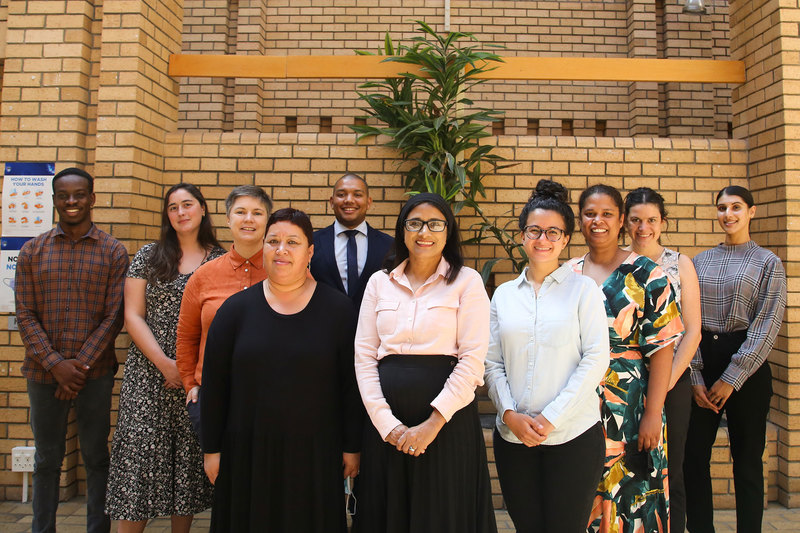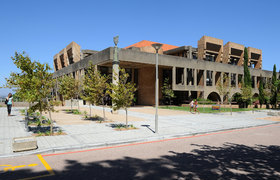Human Rights Day: Protecting the rights of refugees
21 March 2022 | Story Niémah Davids. Photo Je’nine May. Read time 8 min.
The Refugee Rights Unit (RRU) at the University of Cape Town (UCT) is a safe space for refugees and asylum seekers in South Africa – a place where their struggles don’t go unnoticed and where their rights, needs and dreams of a better future are acknowledged and understood.
The RRU started off as a special project within UCT’s Law Clinic. But it quickly developed into a fully-fledged research unit under the leadership and guidance of respected human rights lawyer Associate Professor Fatima Khan. Associate Professor Khan currently serves as the director of the RRU, and she runs a tight multifunctional ship. The unit consists of a research hub, provides teaching and training to both undergraduate and postgraduate students, and conducts advocacy and training programmes aimed at various stakeholders, including members of the judiciary. In addition, the unit also runs the Refugee Rights Clinic, which consists of the children’s rights clinic (headed by Nandi Rayner), the refugee status determination clinic (headed by Monique Schoeman), as well as the detention and rights clinic (headed by Shazia Sader).
To date, the RRU has assisted thousands of refugees and asylum seekers in the Western Cape. In celebration of Human Rights Day, UCT News shines a spotlight on the significant role the unit plays in the province, and its work serving this vulnerable, underrepresented sector of society.
“Through our work, our aim is to reinforce the rights of refugees and asylum seekers in South Africa and to strengthen the rule of law more broadly.”
“Through our work, our aim is to reinforce the rights of refugees and asylum seekers in South Africa and to strengthen the rule of law more broadly. It gives us great pleasure to come to work every day and to serve this sector of our society, and to make a difference in their lives in the process,” said Sally Gandar, the newly appointed head of strategic litigation and advocacy at the RRU.
Championing the course
According to the United Nations High Commission for Refugees, refugees flee their countries of birth as a result of war, violence, conflict or persecution, and cross an international border to find safety in another country. Data publicised by the South African Department of Home Affairs in 2020 revealed that more than 100 000 documented asylum seekers and over 80 000 refugees call South Africa home. That number is expected to have increased dramatically in the past two years.
Understandably, Khan said, taking refuge in a foreign country thousands of kilometres from home and far from a solid support structure is difficult, add a list of bureaucratic challenges to the mix and you have a living nightmare for refugees.
It’s at this point when the unit steps in to help. The RRU spends much time assisting refugees and asylum seekers with accessing the correct documentation and play an active role in registering children with temporary asylum permits in schools. Added to that, facilitating general awareness campaigns to counter xenophobia and encourage social cohesion, registering the birth of new-born babies and helping refugees and asylum seekers access employment opportunities and other basic services like healthcare and education, forms part of the unit’s core function.
“These are just some of the common barriers that refugees and asylum seekers face every day in South Africa and [this] is where we play a role. Through litigation, advocacy and one-on-one support, the RRU helps them to overcome these hurdles,” she said.
A tug of war
In South Africa, refugees and asylum seekers are protected according to the principles of the Constitution and under the Refugees Rights Act. The act in particular states that refugees and asylum seekers have the right to freedom of movement; they have the right to work; and they have the right to access basic services such as healthcare and education. Since the advent of democracy, South Africa has been praised for its progressive refugee rights legislation, but all that changed in 2020.
“In January 2020 significant changes were made to the Refugees Rights Act, which have completely undermined South Africa’s commitment to international refugee law and the Constitution.”
“In January 2020 significant changes were made to the Refugee Rights Act, which have completely undermined South Africa’s commitment to international refugee law and the Constitution. These amendments must be challenged and it’s for this reason that we [RRU] created a dedicated strategic litigation unit,” Khan said.
The COVID-19 pandemic, which sparked a national state of disaster and a nationwide shutdown in March 2020, exacerbated this crisis. During lockdown, Khan said South African citizens had easy access to Home Affairs offices for birth registrations, IDs and passport applications. But Refugee Reception Offices were closed. Subsequently, the repercussions on refugees and asylum seekers have been far-reaching.
“The South African government has undermined and negated its commitments when it comes to protecting refugees and asylum seekers. This has created great hardship for this vulnerable but resilient group within our society,” Khan said.
Fix the problem
Gandar implored government to fix what is broken. She said urgently resuming all services at Refugee Reception Offices around the country, improving in-office capacity, the quality of adjudications on refugee claims and the length of time it takes to process an asylum claim (currently it can take several years) are critical.
“In our work at the RRU we have seen countless of poor-quality decisions made regarding asylum applications that have had severe implications on people’s lives. Drastically improving the quality of Refugee Reception Offices will make a big difference to the lived experience of refugees and asylum seekers in South Africa,” she said.
“As a country, we need to adopt a fairer and more just system when it comes to the way we treat refugees and asylum seekers.”
By streamlining this process, she said, government will ensure that refugees and asylum seekers are in no way disadvantaged and that registering the birth of a child, accessing basic services such employment opportunities, education and healthcare facilities, and even starting a business is simple and hassle free.
“It is absolutely important to acknowledge that refugees bring more than just their possessions to a country. They bring their skills, experience and expertise, and we need to start recognising that and including them,” Khan added.
Be fair and just
Increasingly, research indicates that more individuals are fleeing their countries of origin to seek protection elsewhere. This, Khan said, has given rise to the number of refugees not just in South Africa, but globally. In the next three to five years, she said the South African government should focus on putting efficient structures in place and drastically ramping up its asylum determination process.
“Above all, we need a commitment from the Department of Home Affairs to work with us to ensure that refugees in our country are protected, and to acknowledge that they can’t return to their birth countries because of the dangers and threats to their lives.
“As a country, we need to adopt a fairer and more just system when it comes to the way we treat refugees and asylum seekers. This needs to be a priority and a fundamental building block as we continue to build this rainbow nation.”
 This work is licensed under a Creative Commons Attribution-NoDerivatives 4.0 International License.
This work is licensed under a Creative Commons Attribution-NoDerivatives 4.0 International License.
Please view the republishing articles page for more information.










